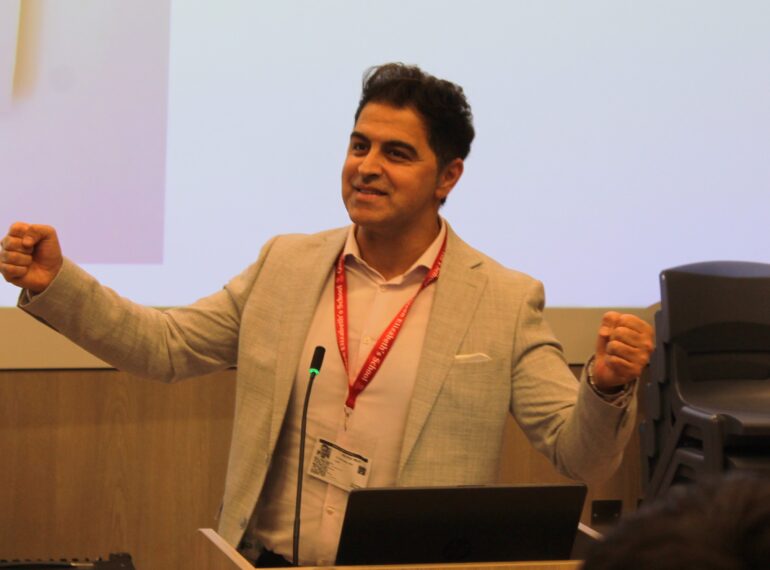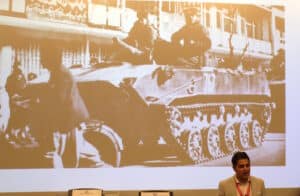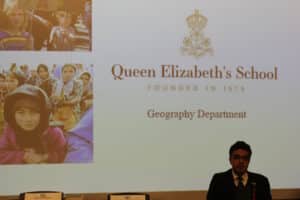
Former Afghan refugee Waheed Arian told Year 9 boys the remarkable story of his life, from arriving near-penniless in the UK aged 15 to becoming a doctor and the leader of medical charities that support both refugees in the UK and patients in conflict zones around the world.
 Over the past 24 years, he has studied at Cambridge, Imperial and Harvard, qualified as a doctor, been recognised as a World Health Organisation digital health expert and won numerous awards.
Over the past 24 years, he has studied at Cambridge, Imperial and Harvard, qualified as a doctor, been recognised as a World Health Organisation digital health expert and won numerous awards.
Dr Arian recounted his astonishing life and career in his lecture – yet he concluded by instead focusing on the importance of community and of giving back.
Headmaster Neil Enright said: “We are very grateful to Dr Arian for coming in to talk to Year 9. His lecture was inspirational and it very much chimed with our mission to produce responsible young men who seek to change their world for the better.”
The assembly was led by Chris Butler, Head of Geography, who said: “His story is an important one: not only did Dr Arian highlight the need to be resilient and have ambition; he also outlined the importance of being kind to one another in our everyday lives and the strength that lies in community action and collaboration – values that the School holds dear. The refugee situation across Europe is increasingly becoming politicised, and it is important that QE boys have the opportunity to listen to those who have experienced life as a refugee and wish to re-tell their experience of the process.”
Dr Arian started his talk by outlining his own early years as a child fleeing from war. He was separated from his father and told Year 9 how he, his mother and his sisters would often cross Afghanistan to see his father in clandestine visits, explaining that this was necessary as his father had fled the army after being pressed into conscription.
Later, Dr Arian and his family fled to Pakistan to be together, with a journey that saw them having to avoid air strikes from Soviet forces who had mistaken the refugee column for Mujahideen rebels. Whilst safe in Pakistan, they were living in unimaginable poverty inside refugee camps and informal housing blocks. For most of the time they lived ten to a room, without basic sanitation or access to education. He largely taught himself, from textbooks bought from street-sellers, and learned English from the BBC World Service.
Reflecting on these experiences during the lecture, he emphasised the importance of compassion and empathy, revealing how it was often only the kindness of fellow refugees that allowed him and his family to get by. One example was when a local volunteer doctor treated his bout of tuberculosis – it was then that he determined to devote his life to healing others.
Arian’s family returned to Kabul following the Soviet withdrawal in 1989, but when the ensuing civil war intensified a decade later, his parents, wanting him to have better prospects in life, sent him to the UK.
The focus of the next portion of the talk was hope: alone, in a foreign country, and with just £60 – his parents’ meagre savings – in his pocket, he could have easily given up in despair at the dire hand life had dealt him. Yet instead he persevered. Working through anxiety and PTSD, he supported himself by taking jobs in shops and – disregarding the advice of those who suggested he set his sights on becoming a taxi driver – going to night school. After taking his A-levels, he was accepted into Trinity Hall, Cambridge, later finishing his clinical studies at Imperial.
 He impressed upon the Year 9s the value of always holding on to hope, even in the toughest of times, explaining how his dream of becoming a doctor fuelled him during his studies, which culminated in him eventually getting a scholarship at Harvard Medical School. He now works as a Accident and Emergency doctor in North West England.
He impressed upon the Year 9s the value of always holding on to hope, even in the toughest of times, explaining how his dream of becoming a doctor fuelled him during his studies, which culminated in him eventually getting a scholarship at Harvard Medical School. He now works as a Accident and Emergency doctor in North West England.
In the last part of the talk, Dr Arian focused on the importance of giving back to the community. He highlighted how his own experiences shaped his desire to start the charity, Arian Teleheal, in 2015. It links doctors in conflict zones such as Afghanistan with colleagues in the UK, helping to ensure that people living there can have a decent standard of healthcare, not least so that disease does not hold them back in their lives.
Dr Arian has risen to become one of the most influential medics in the NHS. In addition to working as an NHS doctor and running Arian Teleheal, in 2020 he also founded Arian Wellbeing, which aims to link psychologists, licensed therapists, personal trainers and nutritionists to offer unique, personalised holistic care for refugee trauma and PTSD patients.
He discussed his work with the two charities and took questions from the boys, declaring himself later to have been impressed with their eloquence and their understanding of the migration process.
Dr Arian was introduced to the Year 9 audience in the Friends’ Recital Hall by Saim Khan, a Year 12 geographer, who said afterwards: “It was an inspiring and insightful talk, and one which created much food for thought.”
